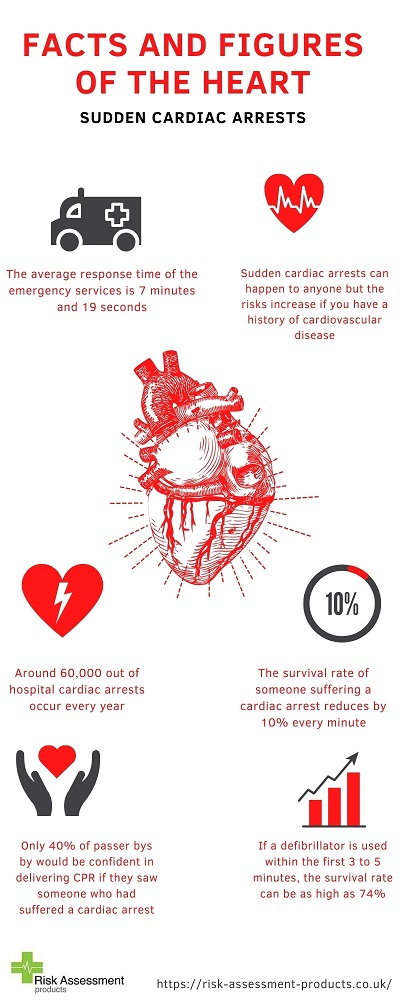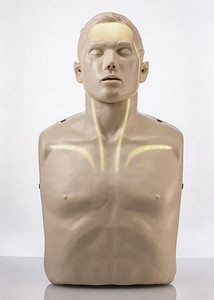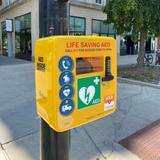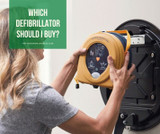What is a sudden cardiac arrest (SCA)?
The heart has an electrical system that controls the pace it beats at and the rhythm of your heartbeat. Most people will live their lives not having any troubles with their heart and will not experience anything different to their normal heartbeat. Problems with the heart’s electrical system however, can cause an irregular heartbeat called an arrhythmia.
There a number of different types of arrhythmia which can cause the heart to beat too fast, too slow, irregularly or for them to stop the heart pumping blood altogether - this leads to a cardiac arrest. Once the heart stops beating, oxygenated blood is no longer being delivered to the brain, if this happens for a number of minutes and no care is given, the patient will unfortunately more than likely pass away.
It is common for sudden cardiac arrests to be confused with a heart attack. They are however, very different. A heart attack occurs if blood flow is prevented such as if an artery is blocked. This can often be caused due to lifestyle habits with heart attacks occurring more in those who are overweight, who smoke or those who drink excessive amounts of alcohol.
Also, during a heart attack, the heart usually doesn’t stop beating and the patient is usually awake and they will experience a sharp pain in their chest. If a patient suffers a cardiac arrest, they will be unconscious and their heart will have stopped beating.
Who can suffer a cardiac arrest?
Cardiac arrests can occur to anyone regardless of age, gender or ethnicity and can occur even if risk factors are very low. Individuals who have heart disease however, are at a higher risk of suffering from cardiac arrest
There are a few factors that can cause a cardiac arrest to occur. These can include heart disease or ventricular defibrillation (arrhythmia) however, a cardiac arrest can also be brought on due to physical stress such as intense physical activity, very low blood levels of potassium or a severe lack of oxygen.
There are 7.4 million people in the UK living with circulatory disease with 27% of all deaths being caused due to such diseases. Knowing how to treat someone who is suffering a cardiac arrest therefore can help reduce this figure drastically.
Inherited disorders, when arrhythmia’s run in the family may also be a cause which increases the risk of suffering from a cardiac arrest and even changes in the structure of the heart such as it’s size can also be a contributing factor. It is important to remember however, that often cardiac arrests are unpredictable and as they occur suddenly, prevention can be difficult.
With age, the chances of suffering from a cardiac arrest increase. Males are more likely to suffer a cardiac arrest than females and some studies show that black people with underlying conditions such as diabetes are at a higher risk. These statistics however do not mean that women and younger adults are less likely to suffer a cardiac arrest - they only indicate who is more likely to suffer one.
Can I prevent a cardiac arrest?
There are preventative steps that can be taken if you are concerned that you may be at a higher risk of suffering from a sudden cardiac arrest. There are ways to prevent death from a cardiac arrest depending on whether; you have already suffered from one, you have never suffered but are at high risk due to a heart condition or, you have never had a cardiac arrest and do not have any risk factors.
If you have previously suffered a SCA you are at a higher risk of having another. Studies show that an implantable cardioverter defibrillator (ICD) reduces the chance of dieing if you suffer a second cardiac arrest. ICD’s are surgically placed under the skin in your chest or abdomen and shock the heart to restore it to it’s natural rhythm if you have another cardiac arrest.
Those who have Ischemic heart disease are also at an increased risk of suffering a cardiac arrest. To combat this, your doctor may prescribe you with a beta blocker to reduce your risk. For those who have no history of heart disease or relative risk factors it is recommended to follow a heart-healthy lifestyle. This includes aiming for a healthy weight, managing stress, physical activity and quitting smoking if you do so.
To determine whether someone is suffering from a SCA, a victim will fall unconscious and no heartbeat can be felt. Within an hour before suffering a cardiac arrest, some people have chest pain, a shortness of breath, nausea or vomiting.
What to do when someone suffers a cardiac arrest
When someone does fall ill due to a cardiac arrest, it is paramount that you act quickly. Call the emergency services and begin administering emergency care straight away by giving CPR and using a defibrillator. Defibrillators work to shock the heart so that it can return to it’s normal rhythm. They are designed to be used by anyone so regardless of whether there is a medical professional present or untrained layperson.
Following successful fibrillation, a victim can be treat in hospital for ongoing care and treatment which may include medicines to reduce the risk of suffering another cardiac arrest.

Recent Posts
-
Empowering Communities: The Lifesaving Impact of CPR on Restart a Heart Day
Every year, on and around October 16th, an important event takes place - Restart a Heart Day. This a …16th Oct 2023 -
Which home defibrillator?
80% of all out of hospital cardiac arrests occur at home. Defibrillators are often available in loca …4th Dec 2022 -
Which defibrillator should I buy?
There are many defibrillators available on the market and it can become overwhelming knowing which o …4th Nov 2022




